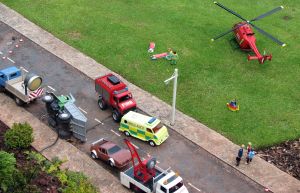 In November, 2012, the Supreme Court of Florida, in Cevallos v Rideout (No. SC09-2238), issued an opinion that buried a misguided and out-dated 2009 decision by the Fourth District Court of Appeals. (Contemporaneously with its decision in Cevallos, the court issued a similar opinion in Birge v. Charron, No. SC10-1755 (Nov. 21, 2012).) The opinion the Supreme Court shot down is that a person injured in a vehicle which has struck the rear of another vehicle cannot prevail unless it is shown that the driver of the trailing vehicle was completely blameless. The 4th’s opinion was in direct conflict with decisions from various district courts of appeal in Florida. Charron v. Birge, 37 So. 3d 292 (Fla. 5th DCA 2010), Cleaveland v. Florida Power & Light, Inc., 895 So. 2d 1143, 1145 (Fla. 4th DCA 2005), Jefferies v. Amery Leasing, Inc., 698 So. 2d 368, 371 (Fla. 5th DCA 1997), Pollock v. Goldberg, 651 So. 2d 721, 722-24 (Fla. 4th DCA 1995), Johnson v. Deep South Crane Rentals, Inc., 634 So. 2d 1113 (Fla. 1st DCA 1994), and Edward M. Chadbourne, Inc. v. Van Dyke, 590 So. 2d 1023 (Fla. 1st DCA 1991).
In November, 2012, the Supreme Court of Florida, in Cevallos v Rideout (No. SC09-2238), issued an opinion that buried a misguided and out-dated 2009 decision by the Fourth District Court of Appeals. (Contemporaneously with its decision in Cevallos, the court issued a similar opinion in Birge v. Charron, No. SC10-1755 (Nov. 21, 2012).) The opinion the Supreme Court shot down is that a person injured in a vehicle which has struck the rear of another vehicle cannot prevail unless it is shown that the driver of the trailing vehicle was completely blameless. The 4th’s opinion was in direct conflict with decisions from various district courts of appeal in Florida. Charron v. Birge, 37 So. 3d 292 (Fla. 5th DCA 2010), Cleaveland v. Florida Power & Light, Inc., 895 So. 2d 1143, 1145 (Fla. 4th DCA 2005), Jefferies v. Amery Leasing, Inc., 698 So. 2d 368, 371 (Fla. 5th DCA 1997), Pollock v. Goldberg, 651 So. 2d 721, 722-24 (Fla. 4th DCA 1995), Johnson v. Deep South Crane Rentals, Inc., 634 So. 2d 1113 (Fla. 1st DCA 1994), and Edward M. Chadbourne, Inc. v. Van Dyke, 590 So. 2d 1023 (Fla. 1st DCA 1991).
The 4th got it wrong in two key ways. Florida law has created a presumption of fault on trailing vehicles. Importantly, the presumption is rebuttable, meaning that it can be overcome with evidence of fault on the part of the lead vehicle. The 4th had decided wrongly that the presumption was absolute, that it could not be overcome in spite of fault evidence to the contrary. Its second error was in concluding that comparative fault (see, Florida Statute 768.81) does not apply in rear-end accident cases. It does apply. The comparative fault doctrine measures each party’s degree of fault in awarding damages. Rather than award 100% to a party bearing some blame, or denying entirely a recovery to a party only partly to blame, the doctrine simply reduces the party’s damages by his or her percentage of fault in causing the accident. Instead of applying this fair procedure, the 4th DCA resurrected the doctrine of contributory negligence, which was replaced in 1973 by the comparative fault doctrine, to deny the claim of the driver of the trailing vehicle. (The contributory negligence doctrine acts as a complete bar to a party bearing any responsibility for causing an accident, no matter how small that fault may be.)
The Supreme Court made two things clear: (1) the presumption of fault on the trailing vehicle in rear end accidents is rebuttable; and (2) the doctrine of comparative fault applies in rear-end motor vehicle accident cases.
************************************************
Contact us toll free at 866-785-GALE or by email (jgale@jeffgalelaw.com) for a free, confidential consultation to learn your legal rights.
Jeffrey P. Gale, P.A. is a South Florida based law firm committed to the judicial system and to representing and obtaining justice for individuals – the poor, the injured, the forgotten, the voiceless, the defenseless and the damned, and to protecting the rights of such people from corporate and government oppression. We do not represent government, corporations or large business interests.
While prompt resolution of your legal matter is our goal, our approach is fundamentally different. Our clients are “people” and not “cases” or “files.” We take the time to build a relationship with our clients, realizing that only through meaningful interaction can we best serve their needs. In this manner, we have been able to best help those requiring legal representation.
 Florida Injury Attorney Blawg
Florida Injury Attorney Blawg

